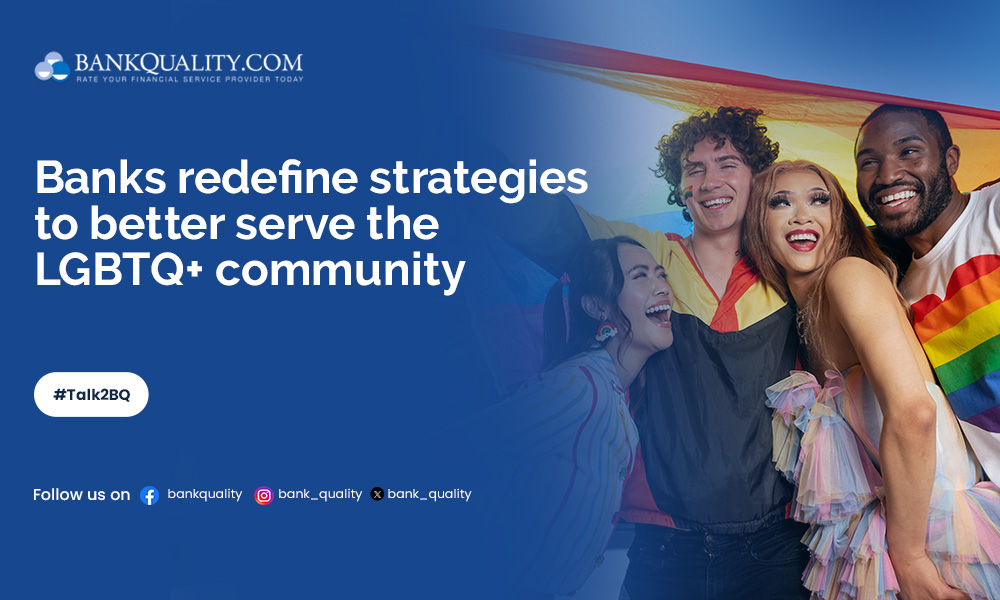
The way the financial sector approaches LGBTQ+ inclusivity has changed significantly in recent years. Banks and other financial institutions are actively redefining their strategies to better meet the varied needs of the LGBTQ+ community as a result of increased public awareness and advocacy efforts.
Embracing equality
The rise of banks that actively support LGBTQ+ rights is one noteworthy aspect of this evolution. Organisations such as Wells Fargo, Capital One, JPMorgan Chase, Amalgamated Bank, and TD Bank have increased their efforts to promote equality and fight discrimination. These banks align their practices with inclusive values by supporting LGBTQ+ organisations and providing tailored financial products.
The National Gay and Lesbian Chamber of Commerce's president and co-founder, Justin Nelson, stresses how critical it is for banks to recognise and cater to the particular financial needs of LGBTQ+ people. This opinion highlights a critical turn towards individualised services that address the unique needs of the community in areas including retirement planning, debt management, mortgages, and insurance.
Innovative solutions
Within the financial sector, the pursuit of inclusion has sparked creative solutions. The contribution from TD Bank to the Somerset Health Proud Center is an example of a focused strategy for offering LGBTQ+-focused care, like hormone replacement therapy and HIV prevention. In a similar vein, Wells Fargo's LGBTQ+-focused financial advisors guarantee customised assistance for a wide range of client needs.
The rise of LGBTQ+-focused organisations such as Superbia signifies a revolutionary development in the field of specialised financial services. Superbia aims to bridge a significant gap in the market for LGBTQ+ individuals by providing discrimination-free life, health, and banking services through its certification as a credit union.
Amalgamated Bank is another institution that actively advocates equality by working with groups like Complete America to provide LGBTQ+ job opportunities and spearheading the "Hate Is Not Charitable" campaign, which denounces hate funding. Internally, they provide LGBTQ+-friendly policies, such as insurance coverage for gender-affirming treatments and free services for advocacy groups.
The following are other financial institutions that promote gender inclusivity:
Capital One
Dedicated to LGBTQ+ inclusivity, Capital One offers benefits such as fertility coverage and health care for gender reassignment. They also support the Equality Act and campaign for LGBTQ+ rights, collaborating with groups like SAGE and Out & Equal to foster community development.
JP Morgan Chase
Through philanthropy, JPMorgan Chase supports LGBTQ+ Americans. During the epidemic, the company donated $5 million to non-government organisations that serve the community. The bank also promotes diversity and inclusion inside the company by creating LGBTQ+ employee resource groups.
Wells Fargo
Wells Fargo provides customised financial services, such as specialised advisors and a website area just for the LGBTQ+ community. To meet the financial needs of LGBTQ+ couples, they also established the accredited domestic partner advisor (ADPA) designation.
Challenges
Despite these advancements, obstacles still exist. According to a survey by the Centre for LGBTQ Economic Advancement, Research, and Movement Advancement Project, 11% of LGBTQ+ Americans encountered prejudice in the banking industry, and 23% encountered financial difficulties because of their gender status. These figures highlight the continued need for financial assistance because of their LGBTQ status. These figures highlight the continued need for financial sector lobbying and change.
Looking back on these developments, it is evident that there is still a long way to go until LGBTQ+ financial inclusion. Banks can help the LGBTQ community and promote social change by putting diversity, equity, and inclusion first. Certified financial planner Cait Howerton said: "Finding banks that offer gender-neutral paperwork and expansive gender options on forms is crucial for gender identity, which may not align with the traditional binary option.”
Finally, the changing landscape of LGBTQ+ inclusivity in banking heralds a new era of financial empowerment and social progress. Banks can pave the way for a more equitable and inclusive future for everyone.